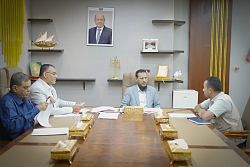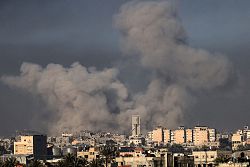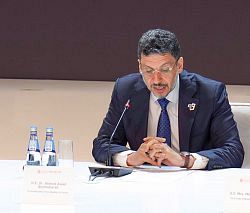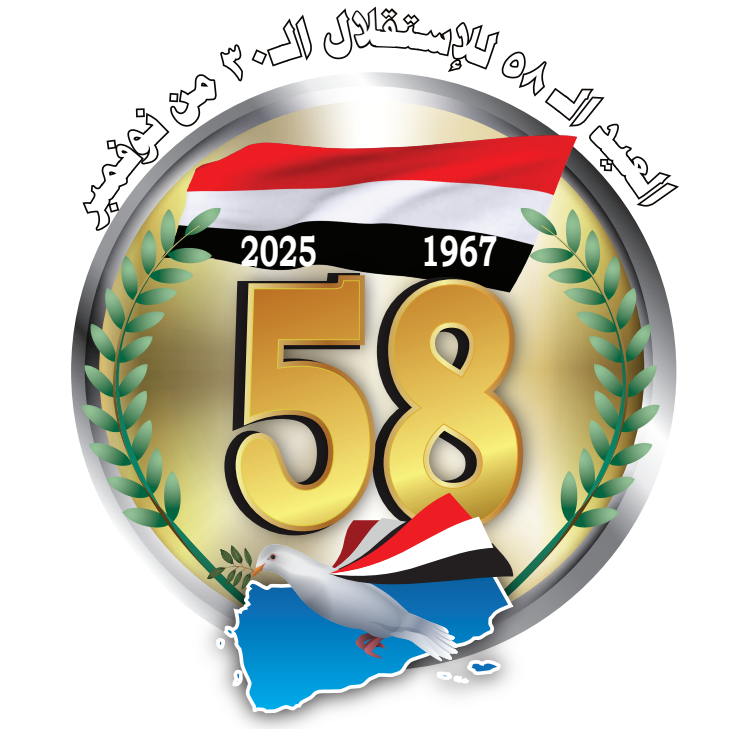
Aden Governor Discusses Progress of Projects Implemented by Kuwaiti Direct Aid Society
Minister of State, the Governor of Aden Abdulrahman Sheikh discussed Monday with the representative of the Direct Aid Society Engineer Mohammed al-Tam interventions across several sectors, particularly water sector projects in Aden.

Casualty Toll from Israeli Offensive on Gaza Rises to 72,070 Martyrs, 171,738 Injured
The casualty toll from the Israeli occupation’s offensive on the Gaza Strip since October 7, 2023, has risen to 72,070 martyrs and 171,738 injured, according to the Ministry of Health in Gaza.

Korea large companies' exports rise 10 percent
Large companies' exports in South Korea rose approximately 10 percent year-on-year in the fourth quarter of last year, driven by increased global demand for semiconductors.

Saudi League: Al-Nassr, Al-Ettifaq and Neom Secure Victories Over Al-Ittihad, Damac and Al-Riyadh
Al-Nassr defeated its guest Al-Ittihad 2–0 in the match that brought them together at Al-Awwal Park Stadium in Riyadh, as part of the 21st round of the Saudi Professional League.
Last Update: ،
2026/02/24
Time
06:21:06
Latest News:
 Minister of Higher Education Discusses Preparations for First International Conference on Digital Transformation ..
Minister of Higher Education Discusses Preparations for First International Conference on Digital Transformation ..
 Minister of Human Rights discusses with Civic Center coordination to protect civilians
Minister of Human Rights discusses with Civic Center coordination to protect civilians
 "MASAM" removes 2676 of Houthis-laid landmines, UXO in a week
"MASAM" removes 2676 of Houthis-laid landmines, UXO in a week
 Minister of Defense chairs meeting with senior military officials, commanders in Aden
Minister of Defense chairs meeting with senior military officials, commanders in Aden
 Yemen-Indonesia Discuss Parliamentary Ties
Yemen-Indonesia Discuss Parliamentary Ties
Latest News:
 Minister of Higher Education Discusses Preparations for First International Conference on Digital Transformation ..
Minister of Higher Education Discusses Preparations for First International Conference on Digital Transformation ..
 Minister of Human Rights discusses with Civic Center coordination to protect civilians
Minister of Human Rights discusses with Civic Center coordination to protect civilians
 "MASAM" removes 2676 of Houthis-laid landmines, UXO in a week
"MASAM" removes 2676 of Houthis-laid landmines, UXO in a week
 Minister of Defense chairs meeting with senior military officials, commanders in Aden
Minister of Defense chairs meeting with senior military officials, commanders in Aden
 Yemen-Indonesia Discuss Parliamentary Ties
Yemen-Indonesia Discuss Parliamentary Ties
PM participates in international ceremony on protecting education day
[09/09/2024 05:44]
DOHA-SABA
Prime Minister Dr. Ahmed Awadh bin Mubarak participated Monday in the international conference held in Doha to celebrate the Fifth Anniversary of the UN General Assembly's declaration of September 9 as the International Day to Protect Education from Attacks.
The conference, organized by the Qatar Foundation for Education, under the theme "Education Under Attack: The Human Cost of War," highlights the severe violations faced by the education sector and children in conflict zones.
It is attended by global leaders, senior UN officials, and representatives of civil society organizations from around the world.
In his speech to the participants at the high-level international event, the Prime Minister expressed his happiness to be part of this celebration and emphasized that the Yemeni government is committed to achieving peace, without which existing challenges will escalate, particularly affecting vulnerable groups like women and children.
He acknowledged the significant role and diligent efforts made by the sisterly State of Qatar, in partnership with 62 countries, to designate September 9 of each year as the International Day to Protect Education from Attacks, a resolution that was unanimously adopted by the UN General Assembly.
He highlighted the significant damage inflicted on the education sector in Yemen, affecting both its infrastructure and educational outcomes.
This has resulted in the worst educational crisis in the country's history. The war has created a major humanitarian disaster that casts a shadow over all aspects of life, and the most pressing danger feared by Yemenis is the complete collapse of the educational process.
He pointed out that children of school age, who make up 34% of the total population, have been particularly affected, with two-thirds of these children living in remote areas, which limits their access to educational institutions. Additionally, their families are frequently displaced in search of safer areas away from the horrors of war.
Bin Mubarak explained that more than 2,860 schools have been damaged by the war, rendering many unable to accommodate students due to complete or partial destruction, or because they are being used as shelters or for non-educational purposes.
He noted that teachers are among the most affected by the educational crisis. Overcrowded classrooms and limited access to professional development opportunities hinder their ability to perform their jobs effectively, threatening their professional future.
Many teachers and university professors have resorted to working in simple trades and have been unable to continue their educational mission.
The Prime Minister emphasized that ensuring safe and quality education for all school-age children is a priority and a governmental commitment. This is in line with the commitment to international agreements and charters related to education.
The government has taken measures and actions within the limits of available resources to ensure the continuity of the educational process, including the resumption of regular classes and the implementation of the approved curriculum from 2014, repairing and expanding damaged educational institutions, and providing teachers' salaries regularly despite their limitations.
He also noted that our country has recently committed to achieving education as the fourth goal among the Sustainable Development Goals, despite the significant challenges posed by the war.
The Prime Minister stressed that ensuring safe and quality education for all school-age children is a priority and a governmental commitment, in line with international agreements and charters related to education.
The government has taken measures and actions within the limits of available resources to ensure the continuity of the educational process, including the resumption of regular classes and the implementation of the approved curriculum from 2014, repairing and expanding damaged educational institutions, and providing teachers' salaries regularly despite their limitations.
He also noted that our country has recently committed to achieving education as the fourth goal among the Sustainable Development Goals, despite the significant challenges posed by the war.
Dr. Ahmed Awad bin Mubarak affirmed that the government will work in cooperation with international organizations concerned with education to assess the state of the education sector in preparation for implementing solutions to prevent its collapse.
He pointed out the establishment of a transitional education plan focusing on emergency education in coordination with partners.
"During implementation, the need arose to develop a sectoral plan that integrates emergency projects with sustainable ones. UNESCO will issue invitations to hold a conference for international organizations and donors to review it, providing them with an opportunity to present interventions in an organized framework. We hope for engagement with and support for these efforts," he said.
He highlighted that developing the educational process in Yemen according to the state-approved curriculum is one of the key priorities the government will work to achieve, and it will continue to pursue this goal within its available resources.
The Prime Minister reiterated solidarity with all efforts aimed at protecting education from attacks, particularly with our brothers in Palestine.
He condemned the systematic targeting by the Israeli occupation of universities and schools in Gaza, the destruction of the educational system in the region, and the deprivation of the Palestinian people of all their rights, including their right to education.
He expressed gratitude to Her Highness Sheikha Moza bint Nasser, the founder of "Education Above All," commending her efforts and those of the organization and its staff to ensure access to education for the most vulnerable and marginalized groups to open future opportunities for them.
During the conference, several speeches were delivered, including one by the Chairperson of the Education Above All Foundation, Sheikha Moza bint Nasser, and representatives from countries affected by conflicts. All addressed the increasing number of attacks on educational institutions, which rose by 20% in the past year, highlighting the importance of taking decisive action to ensure that schools are safe havens for students and educational staff from threats.
Key words:
representatives - infrastructure - implementation - International - international - interventions - establishment - organizations - opportunities - organization - Aden Governor Discusses Progress of Projects Implemented by Kuwaiti Direct Aid Society
Aden Governor Discusses Progress of Projects Implemented by Kuwaiti Direct Aid Society  Minister of Higher Education Discusses Preparations for First International Conference on Digital Transformation
Minister of Higher Education Discusses Preparations for First International Conference on Digital Transformation  Minister of Human Rights discusses with Civic Center coordination to protect civilians
Minister of Human Rights discusses with Civic Center coordination to protect civilians "MASAM" removes 2676 of Houthis-laid landmines, UXO in a week
"MASAM" removes 2676 of Houthis-laid landmines, UXO in a week  Minister of Defense chairs meeting with senior military officials, commanders in Aden
Minister of Defense chairs meeting with senior military officials, commanders in Aden Yemen-Indonesia Discuss Parliamentary Ties
Yemen-Indonesia Discuss Parliamentary Ties Yemen-Syria Discuss Economic Cooperation
Yemen-Syria Discuss Economic Cooperation Yemen Supports Kuwait's Sovereignty Over its Maritime Areas and Elevations
Yemen Supports Kuwait's Sovereignty Over its Maritime Areas and Elevations Presidential Leadership Council Affirms Full Support for Government's Program, Praises Saudi Efforts
Presidential Leadership Council Affirms Full Support for Government's Program, Praises Saudi Efforts  Minister of Transport sets priorities for current stage
Minister of Transport sets priorities for current stage


